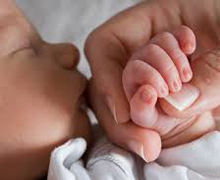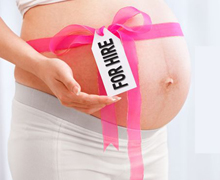By John Stonestreet | Anyone who frequents Starbucks knows that the order you’re least likely to hear in a shop is for “a cup of coffee.” There is no end to the elaborate combinations of flavorings and variations that we caffeine addicts can and have come up with.
Now, this kind of choice is harmless enough. But for Westerners choice has become a way of life, and our self-imagined autonomy over any and every area of life—even life itself—has its victims, as a recent story from the Sydney Herald demonstrates.
Last year, an Australian couple offered a financially-strapped woman in Thailand the equivalent of $11,000 to act as a surrogate to bear their baby. Hundreds of Australians make similar arrangements with Thai women each year, because it’s much cheaper than hiring an Australian woman as a surrogate. In fact, this type of “medical tourism,” or what you might call “bargain hunting for babies,” is common in many western countries.
Four months into the pregnancy, however, the Australian couple learned that one of the twins the Thai woman was carrying on their behalf had Down Syndrome.
And the couple’s response was the same as virtually every Westerner who learns their unborn child has Down Syndrome: They sought to kill the unborn child; in this case urging the woman to have an abortion.
The woman, because of her Buddhist beliefs, refused. So when the twins were delivered, the couple took the twin without Down Syndrome and returned to Australia, leaving the Thai woman with baby Gammy, who in addition to Down Syndrome, also has a congenital heart condition.
The story has provoked outrage, both in Australia and Thailand. Thai officials threw the local surrogacy industry into chaos by limiting surrogacy to relatives of the childless couple.
In Australia, the couple has been excoriated. One mother of two surrogate children called them “greedy, selfish people.” Another Australian compared their actions to someone choosing a toy in a store and wondered what, if anything, they could tell Gammy’s twin about the brother they left behind, ignored, and never supported.
But as convenient and emotionally satisfying as it might feel to demonize this couple, it’s more important to grasp the cultural realities the story reveals about us.
In almost every sense, we Westerners think of ourselves primarily as consumers, with inherent rights to any and all goods in a global marketplace. But our culture of consumer choice goes beyond the shopping mall and the internet into all of life—now even to include the conceiving, birthing, choosing, and raising of children. And so increasingly we see children as consumer products. Commodities to be bought, sold, and discarded. Or, in the case of so many couples choosing not to have children at all, as inconveniences to be avoided, lest I interrupt the life that I have chosen for myself.
All of this is the absurd, tragic, and logical conclusion of our obsession with choice and personal autonomy, and our resistance to any limits whatsoever on personal freedom, no matter how trivial or grave the issue.
And so we use words like “choice” and “reproductive freedom” to justify our unthinkable treatment of human beings, born and unborn. And if our choices include the exploitation of poor women, well that’s just too bad. If it means the “freedom” to reject a child, both in and outside of the womb, because he doesn’t measure up to our expectation, well, that’s what freedom is for.
In such a world, it’s no longer clear what’s for sale and what’s not for sale.
In a remarkable postscript to the story, the birth mother, who was never paid in full, has forgiven the Australian couple. As Christians we should applaud this. But we should also look for, pray for, and work on behalf of the vulnerable… those who are the victims of our fantasies and delusions of autonomy and control.
If you found this blog post of interest, you might want to explore these Free Think University courses:
For this third party post in its full context, please go to:
Parent Consumers, Baby Commodities
© 2014. The Colson Center. www.colsoncenter.org



